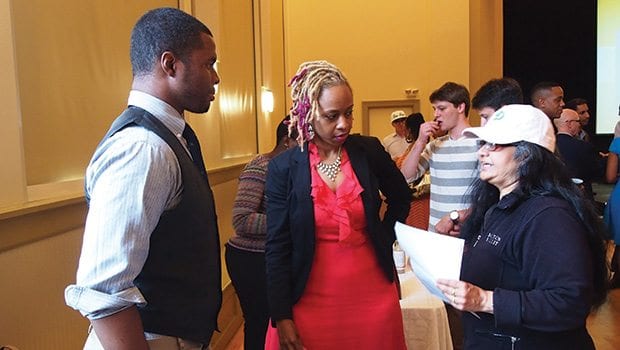Pitch in the City returns
Entrepreneurs compete for startup funds at Hibernian Hall

Magbè Savané, founder of Makomas, a juice company, took home the “best pitch” award at the second “Pitch in the City” held on June 16 at Hibernian Hall and sponsored by OneUnited Bank. With each at different stages of business development, six local entrepreneurs presented their ideas to a panel of venture capital experts and an audience of colleagues, friends, and other interested parties. Savané, along with the others, showcased what makes a great pitch — passion, precision and showing the potential for profit.
But Savané did all of these thing in ways that impressed the judges more than the others. She was promoting her juice business, which the West African native started late last year out of her Revere home.
Pitch in the City’s panel of judges — James Geshwiler, managing director of CommonAngels Ventures; Teri Williams, chief operating officer of OneUnited Bank; and Glynn Lloyd, director of Boston Impact Initiative — liked how Savané got right to the point about the market for her drinks and showed how she can make money on them, largely due to the fact that the purchase price is more than double the cost it takes her to make them. Her profit margins are expected to increase as she ramps up production. Her company, Makomas, has seized the hot market for organic and natural products, and its products can be found in about 20 local stores, including over a dozen Whole Foods Market stores.
Makomas makes three traditional juice drinks that stem from Savané’s African upbringing. All are based on simple recipes she and her mother used to create tasty refreshments. The Makomas array includes a Ginger Drink, Baobab Drink and Hibiscus Tea. All of them use organic West African fruits, flowers and roots and are hand-crafted in small batches by Savané herself. In addition to the water base, each contains three ingredients or less. For example, Ginger Drink is a concoction of water, organic ginger, organic cane sugar and organic lemon. Hibiscus Tea is made up of even less, with water, organic hibiscus tea and organic cane sugar.

Audience members look on as businesses pitch their startup ideas.
Cultivating innovation and entrepreneurship
Pitch in the City was hosted by Banner Biz magazine and Venture Café Foundation, with sponsorship from OneUnited Bank. The other five entrepreneurs competing for the judges’ favor included Joel Edwards of Fittus, a health care app; Rashad Sanders of Loadlytics, a trucking logistics company; Filipe Oliveira of Percival Beer Company; Keith and Renee B. Ware of Saint John 316, a clothing company; and Brandon Ransom and Katia Powell of Techrition, a health consulting company aimed at women of color.
The goal of Pitch in the City is to provide an opportunity for local startups to present their business ideas, get support and feedback on business plans, make important connections for the next stage of growth and practice their message to investors in ways that are persuasive and crucial to their growth.
What makes judges listen
“To us a great pitch is one where we really can see how the business is going to make money and unfold. That can be a combination of where is the revenue coming from and what are my costs, to what things I need to do in order to be successful. [It’s important to] give us clarity that you know the answer to those questions,” said OneUnited’s Williams.
“There is a need to talk about the business and illustrate what makes a good business,” added CommonAngels’ Geshwiler. “Everybody met the standard. A few more people went into a little bit more detail very quickly and were very succinct and crisp about what the economics of their business were.”
Like Geshwiler, Boston Impact Initiative’s Lloyd stressed that a good pitch gets to the point.
“A lot of it is simplicity — getting right to what you do. Knowing your product, knowing your market, how you are going to enter the market … and knowing how your financials work,” he said.
Lloyd said that Savané included all those elements in her pitch for Makomas, which is what set her apart.
After each business owner operator’s presentation, the judges posed tough questions. Their goal: help them adjust their pitch for the future, as well as identify potential weaknesses in the business plan. The most common question was: How do you make money? Attracting and retaining customers also was a big part of the judges’ queries.
Learning by doing
Despite being in the spotlight and put through the wringer, all participants saw the value of the experience.
Magbè Savané said she has been through similar experiences, but any opportunity to do so again helps her improve. She said she was impressed by her fellow entrepreneurs and honored to win “best pitch.”
“It means a lot to me,” she said. “It means that I have to keep going and keep up with the good job I am doing.”
“I thought it was good opportunity to get our name out there in front of a large audience. We have done a lot of pitch events that were smaller and cozy atmospheres, but this was cool. The auditorium feel was a good touch to it,” said Edwards of Fittus. “Anything related to revenue and finances from experienced mentors or anyone who has ever run a business or seen a business run — we take all of that into consideration no matter where we are getting it. That’s how our app has gone from just a novelty to more of a functional business model. Anything related to that, we use and push into our final product,” he said. At a “meta” level, there are other benefits to the Pitch in the City event, too. “Just as a thinking spot or brainstorming spot, it is very valuable to get that info,” Edwards added.
“I enjoyed it. It was fun. Good practice for when the bigger pitches come up,” said Sanders, the founder of Loadlytics. “The most benefit is getting the feedback early on in the pitch so when you do go up for money, you are a lot more effective and efficient.”
Building networks of innovation
Kevin Wiant, executive director of Venture Café Boston, said that an event like Pitch in the City is important to the startup process because messaging is an important part of seeking investment and growing a business. “As you develop your pitch you need to practice that and get some feedback because your business idea is always evolving, the market is always evolving, so you look at how you evolve your pitch so you can communicate your solution and your company clearly to a variety of constituents,” Wiant said. “You need to be constantly working on that, get some feedback, in order to help you evolve how you might best present.”
He also said the event has great value in helping to expand the appreciation of startups and entrepreneurship in the Roxbury community. Venture Café Boston, part of the Venture Café Foundation, has a presence in Kendall Square, Cambridge, where it hosts a weekly Thursday night Venture Café event in partnership with the Cambridge Innovation Center. Venture Café Boston also runs the Roxbury Innovation Center. In addition to Boston, the Venture Café Foundation now has a St. Louis branch, and is exploring other opportunities in other cities.
As stated on its website, the Venture Café Foundation, which began at MIT in 2011, has a three-part mission: (1) build and connect communities of innovation locally, nationally, and internationally; (2) expand the definition of innovation and entrepreneurship beyond making apps; and (3) build a more inclusive economy. Venture Café Boston manages and operates the privately-funded District Hall, a dedicated civic space for public-private collaboration and innovation that’s located in Boston’s Seaport area.






